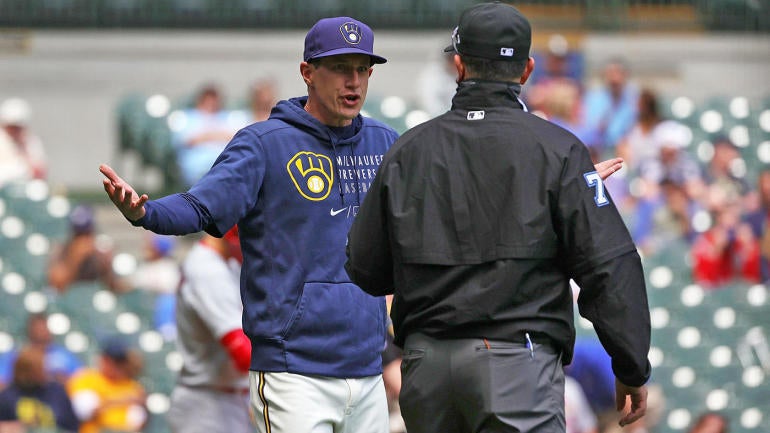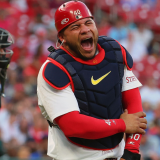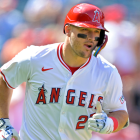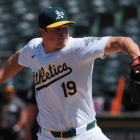
The Milwaukee Brewers on Thursday were blanked at home by Jack Flaherty and the St. Louis Cardinals by a score of 2-0 (box score) and as such lost the rubber match of a key early series between two likely NL Central contenders. Taking the loss was Corbin Burnes, even though he allowed only run one in five innings while striking out nine and walking one. Burnes is now 2-3 on the season despite having pitched to a 1.57 ERA in 2021.
When you see such a thing -- a pitcher with a losing record despite not allowing the opposition to touch home plate all that often -- the issue is always a dearth of run support. In the Brewers' case, their struggles to give Burnes adequate backing is a distillation of their leading problem thus far. That's a lacking offense.
At 20-18, the Brewers are above the water-line, and the bar for contention in the NL Central may not be all that high, depending upon whether the Cardinals can maintain their current pace. That said, Milwaukee is going to need to put more runs on the board if they're to make the postseason for a fourth straight year.
Right now, the Brewers rank 25th in MLB in runs scored despite, at this writing, having played more games than most other teams. They also rank 27th in OPS. Bear in mind that the Brewers play their home games in a ballpark that squarely benefits the offense. They've been bad, especially if you apply that context. It's still relatively early, though, as we're not yet to the 25 percent mark of the season. That means it's possible the Brewer bats have just been unlucky and will find their level soon enough. Unfortunately for those Brewer bats, that doesn't appear to be the case.
To dig a bit more deeply into this, we'll turn to an advanced metric called weighted on-base average (wOBA) and its underlying partner, expected weighted on-base average (xwOBA). Off-putting acronyms aside, these are fairly easy to understand at a conceptual level, and they shed good light on offensive performance.
First, know that wOBA assigns proper value to every possible offensive event that happens while a batter is at the plate. Those proper valuations of singles, doubles, homers, walks, etc., distinguish wOBA from more traditional measures like AVG, OBP, and SLG. Also, for simplicity wOBA is scaled to look like OBP, which means that, say, .400 is elite and .290 is pretty poor. Babe Ruth, for instance, is the all-time leader with a patently absurd wOBA of .513.
As for xwOBA, it's an estimation of what a hitter's wOBA should be based on things like exit velocity off the bat and launch angle. xwOBA attempts to strip away luck -- bad or good -- and defensive play from wOBA and identify a hitter's baseline skill. It's useful for getting an idea of how a hitter figures to perform in the near-term future. Basically, if a hitter's xwOBA is significantly lower than his wOBA, he's probably going to come back to earth at some point. There's some evidence that slower players tend to underperform relative to their xwOBA and faster players tend to overperform, but even so xwOBA has utility. On the other side of things, if a hitter's xwOBA is quite a bit higher than his wOBA, then better days are likely ahead. Here's more on wOBA, and here's more on xwOBA.
As for the 2021 Brewers, right now they rank 25th with a wOBA of .293. While their xwOBA of .308 paints a slightly less grim picture, they still rank 25th in that measure. So, yes, maybe Milwaukee hitters deserve a modestly better fate, but relative to their peers they're no less dismal on that front. Much of what underpins xwOBA are batted-ball indicators, which tend to become meaningful pretty early. That means that, even though it's just the middle of May, the Brewers have genuine worries.
Getting star outfielder Christian Yelich back at some point should help matters, and he's on the cusp of beginning a minor league rehab assignment. Assuming his lower back issues are behind him -- and assuming his (relative) struggles last season were just a consequence of playing a 60-game season in the midst of a global pandemic -- he'll address a major need. However, this is baseball, and one player -- even one with Yelich's MVP ceiling -- can move the needle only so much. Even if Yelich gets back soon, finds his level, and stays healthy, the Brewers could have production deficits at a number of positions.
The rotation and high-leverage bullpen arms are such that the Brewers will probably remain relevant even in the absence of offensive improvement, but if they're to win the division then they'll need multiple bats to come around.






















